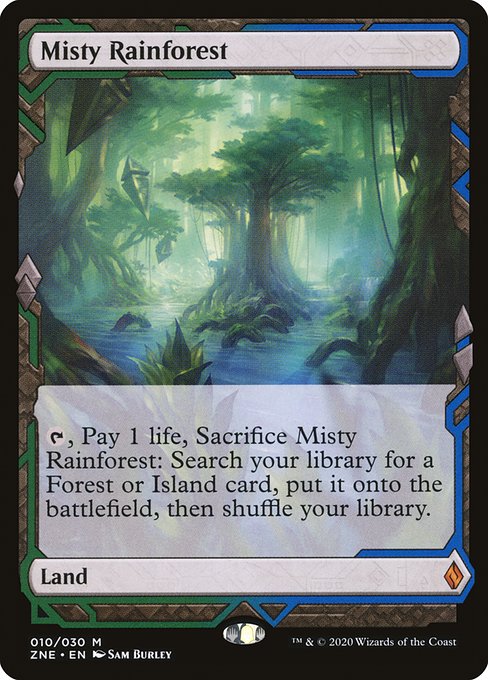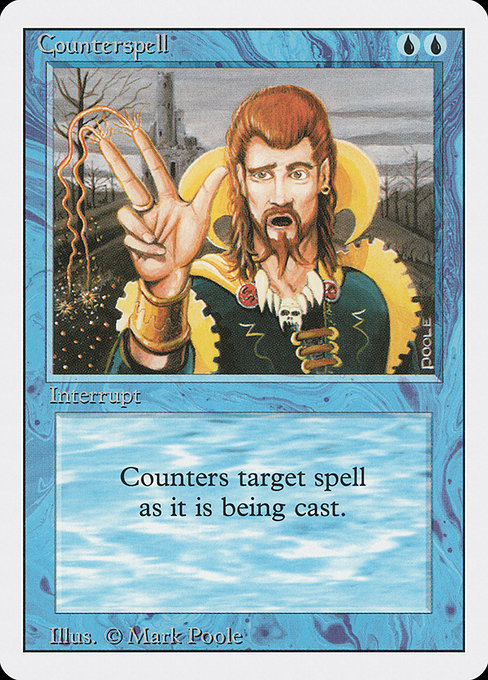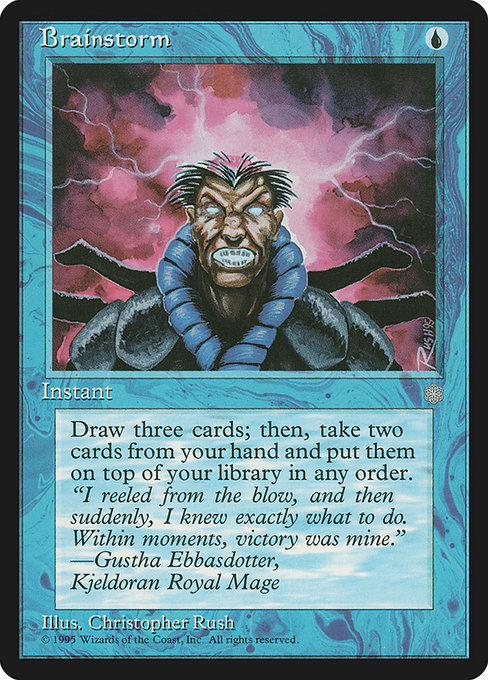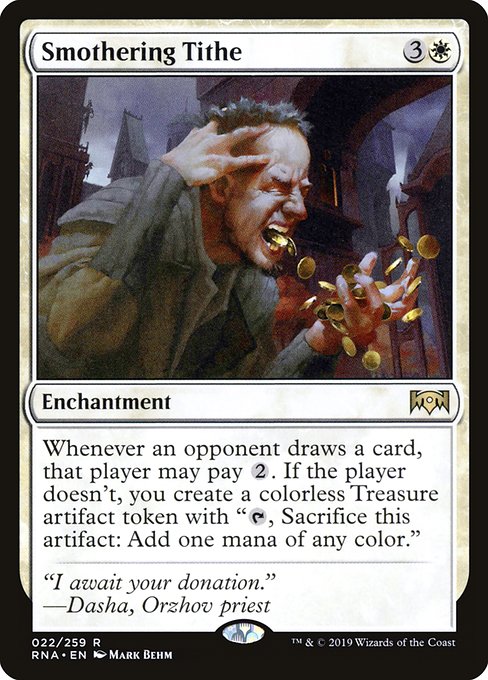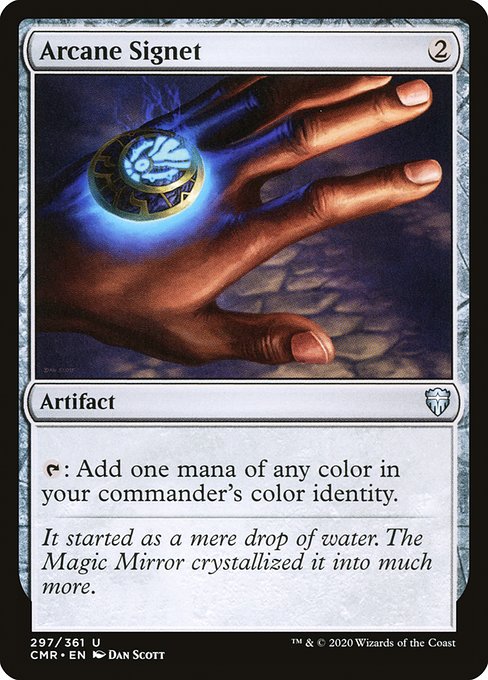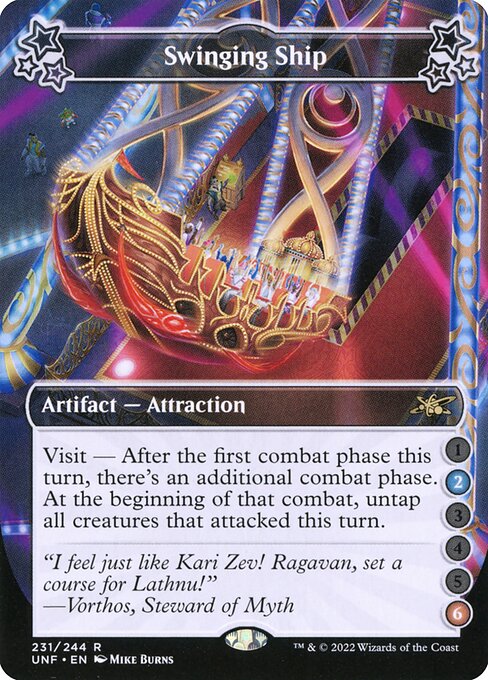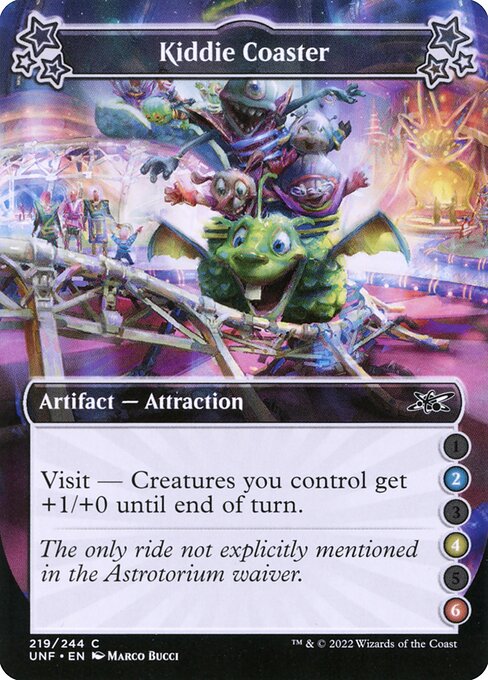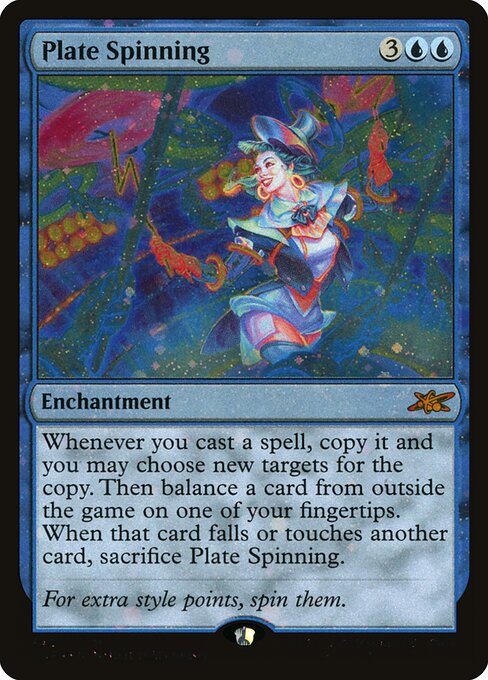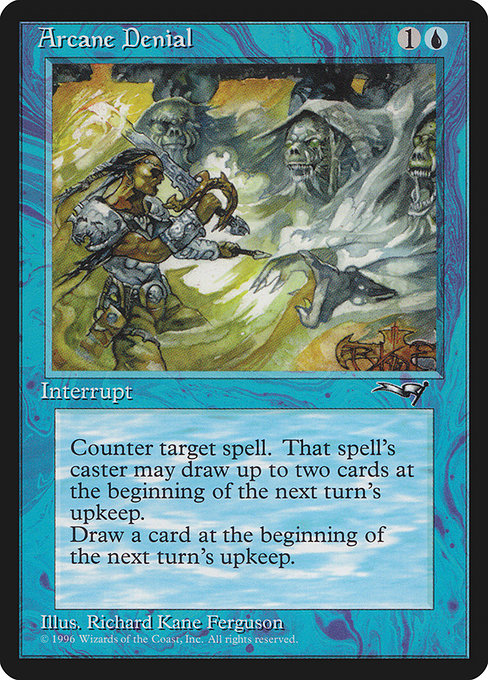
Arcane Denial Full Guide

Guide Sections
Cards Mentioned in This Review
These cards are referenced in the strategy guide belowStrategy Guide
Last updated 2025-06-29TL;DR Summary
Arcane Denial: A versatile common instant that disrupts opponents with a spell counter, while also providing an indirect draw engine for its controller. Its power level is moderate, making it a valuable inclusion in various formats.
- Main use cases: Counter spells and value trades; combos with cards like Counterspell or Daze.
- Popular formats: Commander, as well as casual play and small-format tournaments due to its low cost and versatility. Its ability to draw additional cards can be especially useful in formats where card advantage is crucial.
Arcane Denial's indirect draw effect allows players to gain a turn's worth of value, making it a solid addition to any control or combo deck looking for an inexpensive way to disrupt opponents and maintain card advantage.
Card Mechanics & Interactions
Arcane Denial is an instant that interacts with the game in several ways. Its primary function is to counter a target spell, which can be done as an activated ability or as a triggered ability if the opponent casts the spell during their main phase.
When Arcane Denial resolves, it immediately cancels the targeted spell, rendering it useless for its intended purpose. This has implications on various cards that rely on spells being cast, such as Counterspell and other counterspells that rely on the spell being countered to trigger additional effects.
The card's controller may then draw up to two cards at the beginning of the next turn's upkeep, which can be a significant advantage if left unchecked. However, this effect is contingent upon Arcane Denial resolving successfully during its own main phase or an earlier point in time where it would have otherwise triggered its effect on the stack.
There are situations where Arcane Denial's ability to draw cards may not trigger. For example, if the opponent has a Sword of Light and Shadow equipped to their commander and that commander is declared as being under their control during the upkeep phase, the controller of Arcane Denial would lose the ability to draw cards.
Additionally, it's worth noting that cards like Lingering Souls or Estrid, the Masked can create multiple tokens, all sharing the same controller. If one of these tokens has an ability that triggers at the beginning of its owner's upkeep phase, any number of those tokens could potentially draw two cards when Arcane Denial resolves.
In terms of interaction with other cards, Anafenza, Kin-Tree Spirit's ability can be particularly relevant to Arcane Denial. If Anafenza is controlling a creature during the controller's end step and that creature dies in response to Arcane Denial resolving its effect on the stack, Anafenza can generate a 2/2 green Elf creature token at the beginning of the next turn's upkeep.
In general, the potential for drawing two cards when using Arcane Denial is substantial, especially if the controller has Fog or other spells that would create an opportunity to disrupt opponents' plans and subsequently draw multiple cards.
Strategic Applications
Strategic Applications of Arcane Denial
Arcane Denial is a versatile instant that offers significant value in various Commander strategies, particularly those centered around blue control and tempo-based gameplay.
- Blue Control Decks: This card excels in blue control builds that focus on disrupting opponents' plans while maintaining a strong card draw engine. Cards like Counterspell, Force of Will, and Pendrell Miere work in tandem with Arcane Denial to create an impenetrable wall against opponents' spells.
- Combo-Based Decks: In combo-oriented decks, Arcane Denial provides a crucial element for maintaining tempo while executing the combo. By countering opponent's removal spells and disrupting their plans, players can focus on resolving their own game-winning combos.
- Token-based Deks: Token-based strategies, such as those employing Estrid, the Masked or Trostani's Suitor, benefit greatly from Arcane Denial. By countering opponents' removal spells and allowing token generation to continue uninterrupted, players can create a large, unkillable force on the battlefield.
Some notable Commander archetypes that utilize Arcane Denial include:
- Estrid, the Masked
- Trostani's Suitor
- Adriana, Captain of the Guard
When constructing a deck around Arcane Denial, consider pairing it with cards that provide additional card draw or counter spells. This will enable you to maintain a consistent flow of resources while disrupting opponents' plans.
Example Synergy:
- Arcane Denial + Counterspell + Force of Will
- Arcane Denial + Pendrell Miere + Estrid, the Masked
These synergies demonstrate how Arcane Denial can be integrated into various Commander strategies to create a formidable and consistent gameplay experience.
Advanced Techniques
Arcane Denial is a versatile counterspell with a unique draw benefit that can be leveraged in various Commander strategies. Its ability to counter target spells allows it to neutralize threats from opponents, while its draw effect provides a convenient card advantage.
Synergies:
- Azami's Proof: This Meren of Clan Nel Toth commander is all about manipulating the opponent's graveyard and disrupting their plans. Arcane Denial's counterspell ability complements Azami's proof perfectly, allowing you to neutralize threats while also creating a window for Azami's ultimate ability.
- Liliana of the Veil: As a control-oriented commander, Liliana's ability to mill cards is enhanced by Arcane Denial's draw effect. By casting Arcane Denial and then using Liliana's -2 ability, you can create a snowball effect that mills your opponents' libraries while denying them spells.
- Saffron, Impostor Genius: This commander benefits from a high card advantage, which Arcane Denial provides through its draw effect. By combining Saffron with Arcane Denial, you can generate an impressive number of cards and disrupt your opponents' plans.
Rules Tricks:
- Countering spells during the opponent's turn: If an opponent attempts to cast a spell on their own turn, you can use Arcane Denial to counter it. This denies them the opportunity to resolve the spell and creates a window for your commander's abilities.
- Using Arcane Denial to create a "free" draw: If an opponent casts a spell that doesn't have any additional costs (e.g., Spectral Procession), you can use Arcane Denial to counter it. Then, during the next turn's upkeep, both players will draw two cards.
Interactions:
- Arcane Denial interacts poorly with Twinning: If an opponent attempts to cast a spell on their own turn while Twining is resolved, Arcane Denial cannot be played as it would count itself as part of the spell being cast.
- Using Arcane Denial in combination with Counterspell: This creates an interesting dynamic where you can play both cards and create a double-advantage situation. However, this relies on specific deck composition and commander synergy.
Common Mistakes
Common Mistakes with Arcane Denial
Arcane Denial is a versatile instant that can be used to disrupt opponents' plans or generate card advantage. However, players often make mistakes when using this card, especially in Commander formats.
Misunderstanding the Trigger
One common mistake is misunderstanding the trigger for drawing cards. The Oracle text states "Its controller may draw up to two cards at the beginning of the next turn's upkeep," but it doesn't specify that you can only draw cards if Arcane Denial was countered. In reality, you will always draw a card (or two) at the start of your next turn's upkeep, regardless of whether Arcane Denial successfully counters a spell or not.
Timing Issues
Another mistake is paying attention to the timing of Arcane Denial's effect. Since it says "Its controller may draw up to two cards," some players think they can choose when to draw their bonus card. However, the trigger happens at the beginning of your next turn's upkeep, so you won't be able to use it during the end step of your current turn or as a response.
Miscounting Spells
Players also often miscount the number of spells that have been countered by Arcane Denial. Remember that only one spell can be countered per Arcane Denial activation. If an opponent tries to cast multiple spells in a row, you'll need to use separate instances of Arcane Denial to counter each one.
Poor Synergies
Finally, players may not fully realize the potential synergies with other cards that have built-in draw triggers or abilities. For example, pairing Arcane Denial with cards like Ancestral Recall or Simian Spirit Guide can create a powerful card advantage engine.
By being aware of these common mistakes, you can optimize your deck's performance and make the most of Arcane Denial in your Commander games.
Conclusion
Arcane Denial is a versatile and affordable instant that can be used in a variety of Commander decks. Its primary function is to counter a target spell, making it an excellent choice for players looking to disrupt their opponents' plans.
When Arcane Denial counters a spell, its controller may draw up to two cards at the beginning of their next turn's upkeep. This ability provides a significant advantage, especially when paired with other draw effects. In addition to its counter magic capabilities, Arcane Denial can also be used as a budget-friendly alternative to more expensive counterspells like Counterspell or Mana Leak.
Key Takeaways
- Arcane Denial is an affordable option for players looking to incorporate counter magic into their deck.
- While not as efficient as Counterspell, it offers a more budget-friendly alternative.
- Other budget-friendly options in Commander include Mana Leak and Spellskite.
This analysis provides an overview of the card's mechanics, strategic applications, and budget-friendliness.
Deckbuilding & Synergies
Arcane Denial is a versatile instant that can be used in various Commander decks and color identities. Its ability to counter spells makes it a great fit for control decks, while its draw aspect allows it to support card advantage strategies.
Commanders:
- Azami, Lady of Scrolls (Mono-Blue): A classic choice for blue-based control decks, Azami's ability to draw cards and disrupt opponents' plans pairs well with Arcane Denial.
- Niv-Mizzet, the Firemind (Mono-Blue): This Commander loves drawing cards and generating value, making Arcane Denial a natural fit.
- Yidris, Maelstrom Wanderer (Azorius or Mono-Blue): Yidris's ability to generate card advantage through its own abilities complements Arcane Denial's draw aspect.
Color Identities:
- Blue-White (Azorius): This color combination excels at control and card advantage strategies, making Arcane Denial a great addition.
- Mono-Blue: As seen in the Azami and Niv-Mizzet examples above, Mono-Blue decks can highly benefit from Arcane Denial's abilities.
Themes:
- Card Advantage: Arcane Denial's draw aspect makes it a natural fit for decks focused on generating value through card draws.
- Control: The ability to counter spells makes Arcane Denial a great choice for control decks that aim to disrupt opponents' plans.
- Combo: Arcane Denial can be used as part of more complex combos, particularly in conjunction with cards like Sylvan Library or Trostani's Invocation.
Synergy Cards:
- Draw Spike: Cards like Premature Burial, Sylvan Library], and [[Trostani's Invocation generate card advantage, which complements Arcane Denial's draw aspect.
- Counterspells: Include cards like [Counterspell, [Fact or Fiction, and [Mana Leak to provide additional disruption.
- Card Draw: Incorporate cards like [Swords to Plowshares, [Day of Judgment, and [Path to Exile to further enable the draw aspect.
Combo Notes:
- Arcane Denial can be used in conjunction with Sylvan Library to generate a significant amount of card advantage.
- When combined with Trostani's Invocation, Arcane Denial allows for a potentially game-changing play by drawing multiple cards and generating value.
Format Roles
Format Impact:
In Commander, Arcane Denial is a solid addition to any blue deck, providing a versatile counter spell that can neutralize opponents' threats while also offering a secondary benefit of card draw. Its low cost and accessibility make it an attractive option for casual players.
- Competitive: While not a game-breaker, Arcane Denial can be included in competitive Commander decks as a useful tool to disrupt opponents' plans.
- Casual: This card is highly valued in casual Commander play due to its simplicity and effectiveness in neutralizing threats.
- Banned/Restricted: Not banned or restricted in any format.
Other Formats:
In addition to Commander, Arcane Denial is legal in other formats such as Pauper and Brawl. Its common rarity and low cost make it a staple in many blue decks across various formats.
- Pauper: A popular choice for Pauper decks due to its low mana cost and ability to counter spells.
- Brawl: Can be included in Brawl decks to provide an additional layer of protection against opponents' spells.
Comparative Examples:
For comparison, consider Counterspell and Daze, both classic blue counterspells that have been staples for years. While more powerful than Arcane Denial, they are also more expensive and less accessible in terms of cost. Meanwhile, Phantasmal Force offers a similar effect to the card draw aspect of Arcane Denial, but its higher mana cost makes it less appealing in many situations.
Conclusion:
Arcane Denial is a valuable addition to any blue deck in Commander, offering both counterspells and card draw. Its low cost and accessibility make it an attractive option for casual players, while its inclusion in competitive decks can help disrupt opponents' plans.
Key Scenarios
Key Scenarios & Matchups
Countering Opponents' Spells Arcane Denial shines in matchups where opponents rely heavily on their spell arsenal, such as against aggressive combo decks or control strategies. By countering targeted spells with Arcane Denial, you can disrupt their plans and give yourself an advantage.
- Effective against decks featuring high-power creatures like Liliana of the Veil or Zurgo Bellstriker
- Can be a game-changer in matchups against combo decks reliant on spells like Mox Opal or Chrome Mox
Draw Advantage The secondary effect of Arcane Denial allows you to draw up to two cards at the beginning of your next turn's upkeep. This can provide a significant advantage, especially when paired with other draw effects.
- Combines well with card draw spells like Fact or Sylvan Library
- Enhances the value of cards that generate additional draws, such as Misty Rainforest
Multiplayer Politics In multiplayer games, Arcane Denial can have a significant impact on the board presence and control. By countering opponents' spells, you can influence the game's trajectory and create opportunities for yourself or your allies.
- Can be used to protect important artifacts or enchantments from being countered
- May be used as a way to disrupt opponents who rely heavily on their spell arsenal
History & Meta
Arcane Denial's History and Notable Appearances
Printings: Arcane Denial has been printed in various sets across different Magic: The Gathering expansions. Its set designation is simply "all," indicating that it has appeared in numerous sets throughout the game's history.
Tournament Presence: Although not a staple in Modern or Legacy formats, Arcane Denial has seen play in some Commander (EDH) decks due to its ability to disrupt opponents and create card advantage for itself. However, it is not as prominent in competitive tournaments as other counterspells like Counterspell Counterspell.
EDHREC Stats: According to EDHREC, Arcane Denial has an EDHREC rank of 57, indicating its moderate popularity among Commander players. It appears in around 2% of decks and is often used in combination with other cards that provide card draw or counterspells, such as Counterspell Counterspell, Dampen Thought Dampen Thought, or Brainstorm Brainstorm.
Iconic Decks: Arcane Denial's versatility has led to its inclusion in various Commander decks, often serving as a budget alternative to more expensive counterspells. One notable example is the "Azami, Lady of Scrolls" deck archetype, which focuses on card draw and counter-magic strategies.
Flavor & Lore
In the realm of Azsar, where the fabric of reality is woven with magical energies, the art of spellcasting is a revered tradition. Arcane Denial, a humble instant from the set of all things arcane, serves as a testament to this rich history.
As the name suggests, Arcane Denial's primary function is to counter a target spell, rendering its opponent's carefully crafted plan null and void. This ability is reminiscent of the legendary Wizard-King, Azsar I, who was said to possess unparalleled mastery over the arcane arts. His most trusted advisor, the enigmatic mage Lyra, would often employ similar tactics to disrupt her foes' plans.
When Arcane Denial counters a spell, its controller may draw up to two cards at the beginning of their next turn's upkeep, allowing them to replenish their hand and potentially set the stage for a counterattack. This mechanic echoes the concept of "karmic resonance," where the energies expended in countering an opponent's spell are said to reverberate, amplifying the caster's abilities.
In combat, Arcane Denial's effectiveness is most pronounced when paired with other counterspells, such as Counterspell or Spellskite. Together, these cards form a formidable barrier against enemy magic, forcing opponents to adapt and improvise. The wise strategist Arinthal, known for her mastery of defensive magic, would often utilize Arcane Denial in conjunction with Doom Blade, creating an impenetrable shield that left foes bewildered and powerless.
Arcane Denial's subtle yet effective design has earned it a place among the most respected counterspells in Azsar. While not as flashy as some of its more exotic counterparts, this common instant remains a reliable choice for those who value cunning over brute force. Whether employed by a novice mage seeking to hone their skills or a veteran wizardcrafting intricate strategies, Arcane Denial stands as a testament to the enduring power of magical denial.
Budget/Alternatives
Arcane Denial: A Budget-Friendly Option for Counter Magic
With a price point of $2.14 USD, Arcane Denial is an affordable choice for players looking to incorporate counter magic into their deck.
Reprint Status and Availability As a common card in the "all" set, Arcane Denial is widely available and has been reprinted numerous times, making it easy to find at a reasonable cost.
Budget-Friendliness
| Card | Mana Cost | Rarity |
|---|---|---|
| Arcane Denial | {1}{U} | Common |
| Counterspell | {2}{U} | Rare |
While not as efficient as Counterspell, which can counter any spell for the same cost, Arcane Denial offers a more affordable option for players on a budget.
Budget-Friendly Alternatives in Commander
- Counterspell: Although it's more expensive than Arcane Denial, Counterspell is an excellent choice for Commander decks due to its ability to counter any spell.
- Mana Leak: This card can help control the board by reducing the mana cost of spells and abilities. It's a common card that fits well in many Commander decks.
- Spellskite: A more expensive but highly effective option, Spellskite can counter spells and also provide a flying body.
Key Takeaways
- Arcane Denial is an affordable option for players looking to incorporate counter magic into their deck.
- While not as efficient as Counterspell, it offers a more budget-friendly alternative.
- Other budget-friendly options in Commander include Mana Leak and Spellskite.
